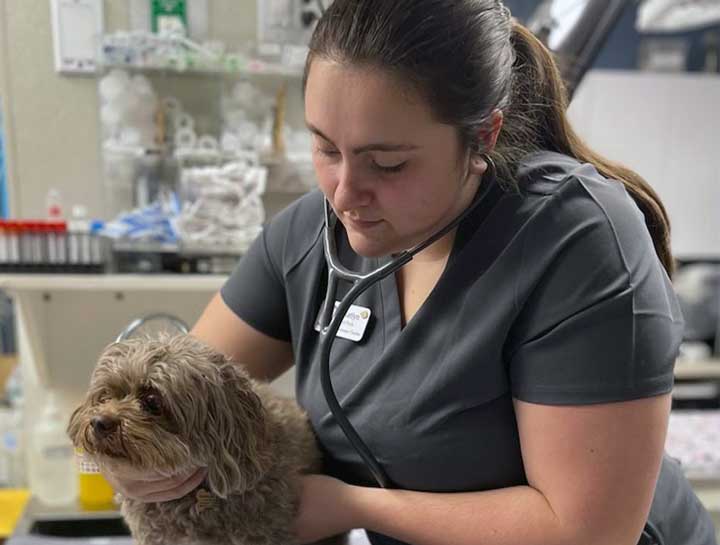Preventive Care for Dogs
Commit to a lifetime of health.
Preventive care is an essential part of keeping your dog happy and healthy. It will give you peace of mind and increase the odds of detecting underlying health conditions before they become advanced and expensive.
How often should my dog see a veterinarian?
At Burlington Veterinary Center, we make our preventive care recommendations using the guidelines established by the American Veterinary Medical Association (AVMA) and the American Animal Hospital Association (AAHA). From there, our veterinarians further customize their suggestions based on hereditary factors including your dog’s age, lifestyle, and medical history.
Typically, we suggest scheduling at least one annual exam during which one of our veterinarians will review your dog’s medical history, assess their behavior, make dietary recommendations, and evaluate any known health conditions they may have.
Vaccinations
In the past, there have been many different vaccination recommendations for dogs and cats in the United States that have been based on the best available scientific information. For many years annual revaccination was considered the appropriate standard practice. However, in recent years there has been mounting evidence that annual revaccination of pets with certain vaccines is not only unnecessary but in rare cases, potentially harmful. The introduction of better vaccines and recent duration of immunity studies suggest that certain vaccines may provide more lasting immunity than previously appreciated. Leaders in the veterinary community believe the appropriateness of various vaccinations and the interval of administration are best assessed in conjunction with a complete physical examination and health evaluation.
Here at the Burlington Veterinary Center, we believe the health status of the individual pet and the pet’s infectious disease risks should dictate the appropriate vaccine selection. In light of the latest evidence that annual revaccination for certain pathogens is no longer scientifically justified and our desire to avoid adverse vaccine-associated events.
Core Vaccines
Burlington Veterinary Center recommends the following routine immunizations for our Canine patients:
- Canine Distemper
- Parvovirus
- Infectious Hepatitis
- Parainfluenza virus combination (modified-live or killed vaccine)
- Rabies (killed virus)
These organisms can cause severe life-threatening diseases and the potential for exposure is considered high. Vaccination is highly recommended for all dogs. Recommended vaccination interval: Beginning at 8 weeks of age, administered at 3- 4 week intervals until the puppy is 16 weeks of age. Then boostered one year later, and administered every 5 years thereafter.
The rabies virus represents a fatal risk to infected dogs and people. Vaccination is required by law in many states (including CT.). Recommended vaccination interval: Administered at 12+ weeks of age and again one year later then administered at 3-year intervals thereafter.
Non-Core Vaccines
- Bordetellosis bacteria (avirulent live vaccine)
- Canine Influenza Virus (killed vaccine)
Bordetella - The risk of exposure is considered to be high, especially in kennel, shelter, show, and breeder groups. We also recommend this vaccine for any patient that is going to be in an area where a high concentration of dogs such as boarding, grooming, daycare, and dog parks. The efficacy of the intra-nasal vaccines is considered to be moderate and adverse event rates are considered low. Administered at initial vaccination series and then annually thereafter. Recommended for dogs at high risk of exposure. Vaccination 2 weeks prior to suspect exposure is suggested.
Canine Influenza - The risk of exposure is considered to be high, especially in kennel, shelter, show, and breeder groups. The efficacy of the vaccine is considered to be moderate and adverse event rates are considered low. Administered as an initial vaccination series repeated in 2 weeks the first year and then annually thereafter. This vaccination is recommended for dogs at high risk of exposure. Vaccination with the second vaccination in the series to be administered 2 weeks prior to suspect exposure is suggested.
At your dog’s annual exam, your veterinarian will answer any questions you may have and discuss other services that could improve their overall health such as spay or neutering, microchipping, and dental care.
To schedule your dog’s annual exam, call us at (860) 675-6009 or request a dog exam appointment online.

